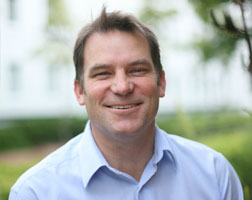Each week Emerging Markets ESG publishes an interview entitled, “Five Questions about SRI.” The interview features a practitioner’s insights about SRI in emerging markets and through Emerging Markets ESG shares this expertise with a wide global audience. The goals of Five Questions about SRI are fourfold:
- To collect a catalogue of examples of SRI in practice in emerging markets;
- To raise awareness about SRI in emerging markets;
- To reflect on what SRI in emerging markets means to practitioners; and
- To enable SRI practitioners in emerging markets to network with peers around the world.
This week’s interview is with Alex Hetherington, Co-founder, Carbon Calculated, Cape Town, South Africa.
Carbon Calculated is one of South Africa’s oldest and most respected carbon management companies. Since 2008, Carbon Calculated has professionally measured and tracked greenhouse gas (GHG) emissions, water usage, electricity consumption and other resources impacting the sustainability credentials of organisations from a wide variety of sectors. Utilising the GHG Protocol developed by the World Resource Institute and the principles of the World Business Council for Sustainable Development, Carbon Calculated’s network of trained professionals are accredited by the GHG Management Institute in organisational carbon accounting, carbon footprint verification and submissions under the Carbon Disclosure Project (CDP). Co-founder of Carbon Calculated, Alex Hetherington has extensive experience assisting large institutions to conduct climate change risk and opportunity analyses. Following an early career in environmental communications, he directed his energies into corporate environmental sustainability, primarily focused on developing and implementing strategies to drive environmental best practices within organisations. Apart from preparing and verifying carbon footprints, Alex provides a broad range of consulting services in environmental policy development and implementation, including impact measurement, benchmarking and advising on cost-cutting opportunities. Alex also helps clients respond to government policies and discussion papers regarding the environment. Alex holds a BA degree from the University of Cape Town and an MSc in Environmental Management from Imperial College, University of London.
Emerging Markets ESG: How would you define socially responsible investment (SRI)?
 Alex Hetherington: SRI is a multi-pronged strategy that demands a real (and comparative) interrogation of environmental, social and economic metrics applicable to investments.
Alex Hetherington: SRI is a multi-pronged strategy that demands a real (and comparative) interrogation of environmental, social and economic metrics applicable to investments.
Depending on the geographies of the investments this might require different emphasis or bias. For example, in South Africa, issues of black economic empowerment and corporate social investment have been dominating ESG issues. Only recently have some select investors or “boutique” institutions been including environmental performance in their investment decision-making.
Emerging Markets ESG: What distinguishes SRI from mainstream investment?
Alex Hetherington: Mainstream investment is typified by an over-riding focus on short-term financial return. SRI will focus on the long-term sustainability of an investment, while simultaneously applying stringent measurement of the impact that investment will have on non-financial issues such as environmental and social impact and corporate governance.
Emerging Markets ESG: Which extra-financial theme – environmental, social or governance – is the most challenging for companies in South Africa to manage?
Alex Hetherington: Up till recently, companies have had to address confusing corporate social investment (CSI) and black economic (BEE) empowerment requirements. These were initially managed on a voluntary basis but are now commonly legislated or governed by sector codes, making them easier to manage.
Environment has been the poor cousin of ESG sustainability, but is now demanding the attention of companies – many of whom are in the early stages of understanding how to manage it.
Emerging Markets ESG: Which extra-financial theme – environmental, social or governance – is the most challenging for investors in South African companies to analyze?
Alex Hetherington: Environmental issues. This is due to there being no South African-driven measurement standards, hence limited local discussion on what is critical to business sustainability in the future. An example is water: 97% of South Africa’s available water supplies are already committed. How will that impact economic growth and where will companies have to locate themselves in order to secure potable water supplies in the future.
Emerging Markets ESG: How has carbon management developed and evolved over the past five years? What are the key issues in carbon management in South Africa today?
Alex Hetherington: Five years ago, carbon footprinting was very much in its infancy, with only a handful of companies voluntarily reporting – mostly out of intrigue, rather than necessity. With the introduction of the Carbon Disclosure Project (CDP), the top 100 companies listed on the Johannesburg Stock Exchange are now obliged to report. This has raised awareness and turned some companies towards active management and setting of reduction targets. The next step is the introduction of an imminent carbon tax that, although initially light, will become more meaningful in time and be one of several drivers forcing companies towards active management of their carbon emissions and other environmental metrics.